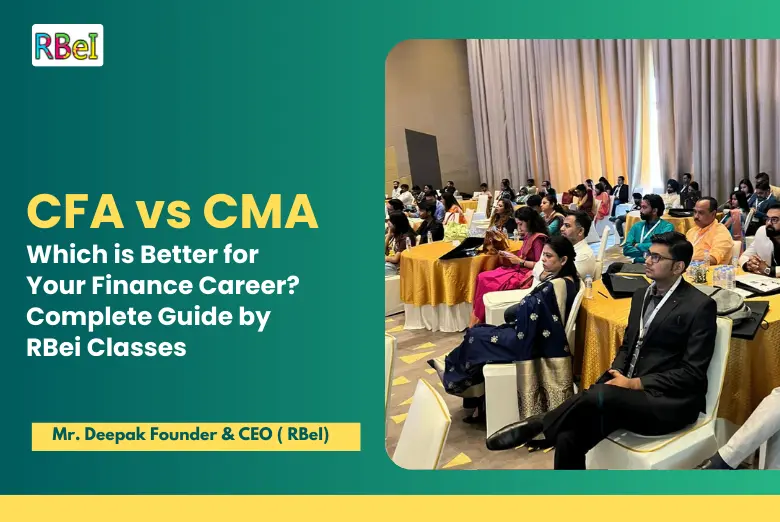In the world of finance and accounting, one of the most common questions students ask is: CFA vs CMA – which is better for building a successful career in finance? The Chartered Financial Analyst (CFA) is considered the gold standard in investment management and portfolio analysis, while the Certified Management Accountant (CMA) opens doors to strategic management accounting and decision-making roles. Both certifications are globally recognized, but their career paths, exam structures, costs, and opportunities differ significantly.
Table of Contents
ToggleAt RBei Classes, we not only guide you through the preparation of certifications like CFA and FRM but also provide complete placement support through our dedicated placement cell. With our industry connections, students who complete their CFA or FRM journey with us have secured jobs in top banks, consulting firms, and financial institutions across India and abroad.
In this blog, we’ll compare CFA vs CMA in detail, explain which certification is right for your goals, and share how RBei Classes ensures that your certification translates into a high-paying job opportunity.
What is CFA?
The Chartered Financial Analyst (CFA) is a globally recognized certification offered by the CFA Institute. It is considered the most prestigious qualification for professionals looking to build careers in investment banking, equity research, portfolio management, and wealth advisory.
The CFA program consists of three levels, covering areas like:
- Financial reporting and analysis
- Portfolio management
- Derivatives and alternative investments
- Economics and quantitative methods
- Ethics and professional standards
With more than 165+ countries recognizing CFA, it is one of the most respected finance certifications worldwide.
At RBei Classes, we train students with exam-focused strategies, practice questions, mock tests, and one-on-one doubt-solving sessions so they not only clear the exam but also apply knowledge in real-world financial roles.
What is CMA?
The Certified Management Accountant (CMA) is offered by the Institute of Management Accountants (IMA), USA. It focuses on management accounting, decision-making, and strategic financial planning.
The CMA program has two parts:

Deepak Goyal CFA & FRM
Founder & CEO of RBei Classes
- 16,000+ Students Trained in CFA, FRM, Investment Banking & Financial Modelling
- 95% Students Successfully Placed • 94.6% Pass Rate In Exam
- Financial Planning, Performance, and Analytics
- Strategic Financial Management
CMA is more suitable for professionals who want to work in corporate finance, cost accounting, budgeting, or strategic roles in multinational companies.
It is highly valued in MNCs like Deloitte, EY, PwC, KPMG, Amazon, and Johnson & Johnson, where decision-making and management accounting are crucial.
CFA vs CMA: A Detailed Comparison
1. Eligibility
CFA Eligibility
- Bachelor’s degree (final-year students can also apply) OR
- 4 years of work experience OR a combination of education + work totaling 4 years
CMA Eligibility
- Bachelor’s degree in any discipline
- Professional certifications equivalent to a bachelor’s degree also accepted
2. Program Structure
CFA Program
- 3 Levels (I, II, III)
- Focus: Investments, Portfolio Management, Equity Research, Risk Management
- Requires 4,000 hours of relevant work experience
CMA Program
- 2 Parts
- Focus: Management Accounting, Decision Making, Strategy
- Requires 2 years of relevant work experience
3. Duration & Flexibility
- CFA: 2–4 years on average, depending on exam success
- CMA: 12–18 months, maximum 3 years allowed to clear both parts
4. Program Cost
- CFA Cost: Around INR 2.5 – 3.0 Lakhs (all three levels, excluding coaching)
- CMA Cost: Around INR 1.0 – 1.5 Lakhs (including membership + exams, excluding coaching)
5. Career Opportunities
CFA Career Opportunities
- Investment Banking
- Portfolio Management
- Equity Research
- Risk Consulting
- Wealth Management
CMA Career Opportunities
- Corporate Finance
- Strategic Planning
- Cost Accounting
- Business Analytics
- Internal Audi
6. Salary Prospects
- CFA Charterholders: Average INR 10–12 LPA; senior roles go beyond INR 40–50 LPA
- CMA Professionals: Average INR 7–10 LPA; senior roles in MNCs exceed INR 20 LPA
7. Global Recognition
- CFA: Recognized in 165+ countries, most valued in investment finance globally
- CMA: Globally recognized but stronger presence in corporate finance roles in MNCs
8. Difficulty Level
- CFA: One of the toughest exams in finance, global pass rate of ~40%
- CMA: Difficult but more focused on management accounting; global pass rate ~50%
CFA vs CMA: Comparison Table
| Criteria | CFA | CMA |
| Eligibility | Bachelor’s degree / work exp. | Bachelor’s degree |
| Program Completion | 3 exams + 4,000 hours exp. | 2 exams + 2 years exp. |
| Duration | 2–4 years | 1–3 years |
| Program Cost | INR 2.5 – 3.0 Lakhs | INR 1.0 – 1.5 Lakhs |
| Salary Prospects | Avg. 10–12 LPA, senior > 40 LPA | Avg. 7–10 LPA, senior > 20 LPA |
| Career Opportunities | Investment Banking, PM, ER | Corporate Finance, FP&A |
| Global Recognition | Stronger in Finance/Investments | Stronger in MNC Corporates |
| Difficulty | More Rigorous | Specialized but Comprehensive |
How RBei Classes Helps You Get Placed After CFA or FRM
At RBei Classes, we don’t stop at exam preparation. Our Placement Cell ensures you get the right opportunities after completing your CFA or FRM journey.
Here’s how we support you:
- Resume building workshops tailored to finance roles
- Mock interviews with industry professionals
- Exclusive tie-ups with investment banks, consulting firms, and Big 4s
- Placement drives connecting students with recruiters in top cities
Whether you aim for investment banking in Mumbai, portfolio management in Bangalore, or corporate finance in Gurgaon, our network ensures you don’t just clear exams—you start your dream career.
Real Success Stories from RBei Classes
- Rohit Sharma – CFA Charterholder
- Joined JP Morgan, Mumbai as an Equity Research Analyst
- CTC: INR 18 LPA
- Anjali Verma – FRM + CFA Candidate
- Placed in KPMG, Dubai as Risk Consultant
- CTC: INR 25 LPA
- Amit Khanna – CMA Certified
- Joined Amazon, Bangalore in Financial Planning & Analysis
- CTC: INR 15 LPA
- Neha Gupta – CFA Charterholder
- Placed in Goldman Sachs, Bangalore as Portfolio Analyst
- CTC: INR 22 LPA
These stories prove that with the right guidance from RBei Classes and the backing of our placement support, certifications like CFA, CMA, or FRM can truly transform your career.
Making an Informed Decision
- Choose CFA if you see yourself in investment banking, asset management, or equity research.
- Choose CMA if you want to excel in corporate finance, management accounting, or strategy roles in MNCs.
Remember, the choice depends on your career vision, study commitment, and financial goals.
At RBei Classes, we guide you step by step in this decision-making process so you invest your time and money in the right direction.
Conclusion
The debate of CFA vs CMA isn’t about which certification is better—it’s about which one is right for your career aspirations.
- If you dream of working in global finance, investments, or portfolio management, then CFA is your pathway.
- If your goal is to lead corporate finance functions and strategic planning, then CMA is your best choice.
Whichever path you choose, RBei Classes ensures you not only pass the exams but also secure high-paying roles in top firms through our dedicated placement cell.
Your journey in finance starts with a decision today. With the right certification and the right mentor, you can shape a career that truly matches your ambition.
Frequently Asked Questions
Q1. CFA vs CMA: Which has better salary prospects?
CFA charterholders usually earn higher in roles like investment banking and portfolio management. CMA professionals earn well in MNCs with strong growth prospects in corporate finance.
Q2. Which is harder, CFA or CMA?
CFA is more rigorous with its three-level exam structure, while CMA is focused but challenging in management accounting.
Q3. Does RBei Classes provide placement after CFA or FRM?
Yes, our Placement Cell connects students with leading recruiters like Goldman Sachs, JP Morgan, KPMG, and Big 4 consulting firms.
Q4. Can I do CFA or CMA along with my job?
Yes, both certifications are designed for working professionals. With the flexible schedules at RBei Classes, many students clear exams while working full-time.
Q5. How long does it take to complete CFA and CMA?
CFA usually takes 2–4 years, while CMA can be completed in 1–2 years.





